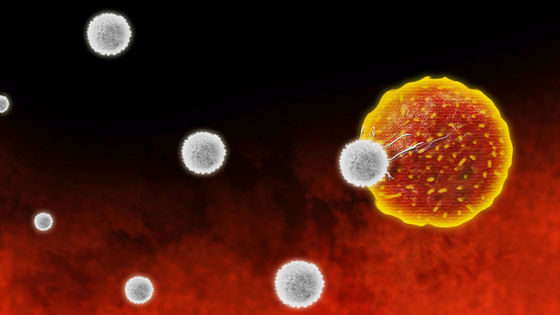What kind of cells are 'T cells' that are the key to the possibility of acquiring immunity to the new coronavirus?

Two studies examining human immune cells recovered from a novel coronavirus infection (COVID-19) have identified the possibility that the human body may develop immunity to the novel coronavirus (SARS-CoV-2). It was
Targets of T cell responses to SARS-CoV-2 coronavirus in humans with COVID-19 disease and unexposed individuals: Cell
Presence of SARS-CoV-2 reactive T cells in COVID-19 patients and healthy donors | medRxiv
https://www.medrxiv.org/content/10.1101/2020.04.17.20061440v1
T cells found in COVID-19 patients'bode well 'for long-term immunity | Science | AAAS
https://www.sciencemag.org/news/2020/05/t-cells-found-covid-19-patients-bode-well-long-term-immunity
WHO issued a statement in April 2020, 'It is unknown if the COVID-19 healer has acquired immunity.' This is because people who recovered from COVID-19 had lower than expected levels of antibodies , and there was no conclusive evidence that the antibodies were effective against SARS-CoV-2.
WHO warns that it is unknown whether healers of the new coronavirus have acquired immunity-GIGAZINE

Under such circumstances, immune cells called T cells are attracting new attention. There are multiple types of T cells, and among them, helper T cells that activate antibody-producing B cells and killer T cells that destroy virus-infected cells and suppress virus growth are famous. Thus, T cells have an immune function that does not depend on antibodies, so it is expected that a certain immune function can be expected even if the antibodies are not very effective against SARS-CoV-2.
Therefore, a research team led by immunological scientists Shane Crotti and Alessandro Sette of the La Jolla Immunological Institute in California, collected immune cells such as T cells from 10 patients who recovered from mild COVID-19, We conducted an experiment in which we were exposed to various viral fragments. As a result, it was confirmed that helper T cells of all patients responded to the spike protein of SARS-CoV-2. In addition, killer T cells targeting SARS-CoV-2 have been found in 70% of patients.

by
'It is encouraging to see a good response of helper T cells to SARS-CoV-2 in COVID-19 cases,' Crotti said. Mr. Sette also said that the immune system can detect SARS-CoV-2 and initiate an effective immune response, pointing out that the human immune system may effectively function for COVID-19. Did.
In addition, the research team of Andreas Teal, an immunologist at the Charité Berlin Medical University in Germany, also found that 15 out of 18 patients admitted with COVID-19 helper T cells responding to the spike protein of SARS-CoV-2. Have found.
Teal and colleagues further find that people who have never had COVID-19 may have acquired immunity against SARS-CoV-2. The team analyzed blood samples from 68 people who had never been infected with SARS-CoV-2 and found that 34% had helper T cells that respond to SARS-CoV-2.
The blood samples used in this experiment were taken between 2015 and 2018 before the discovery of COVID-19, so the team said, 'Immune responses to SARS-CoV-2 have been common in the past. It is most likely acquired by being infected with four human coronaviruses that cause the colds of. '

Columbia University virologist Angela Rasmussen does not guarantee that these studies will not reinfect those who have had a cold or COVID-19, but said, `` T cells are SARS-CoV. A strong response to -2 is a good sign for long-term immunity acquisition. '
Rachel Graham, a virologist at the University of North Carolina at Chapel Hill, said: `` Currently, over 100 SARS-CoV-2 vaccines have been developed, many of which are aimed at eliciting responses to spike proteins. On the other hand, in the experiment of La Jolla Immunology Institute, helper T cells that react with proteins other than the spike protein of SARS-CoV-2 were also found.It is important for vaccine development not to concentrate too much on one protein. He added that the findings opened the way for the development of vaccines that would work with different approaches.
Related Posts:
in Science, Posted by log1l_ks







